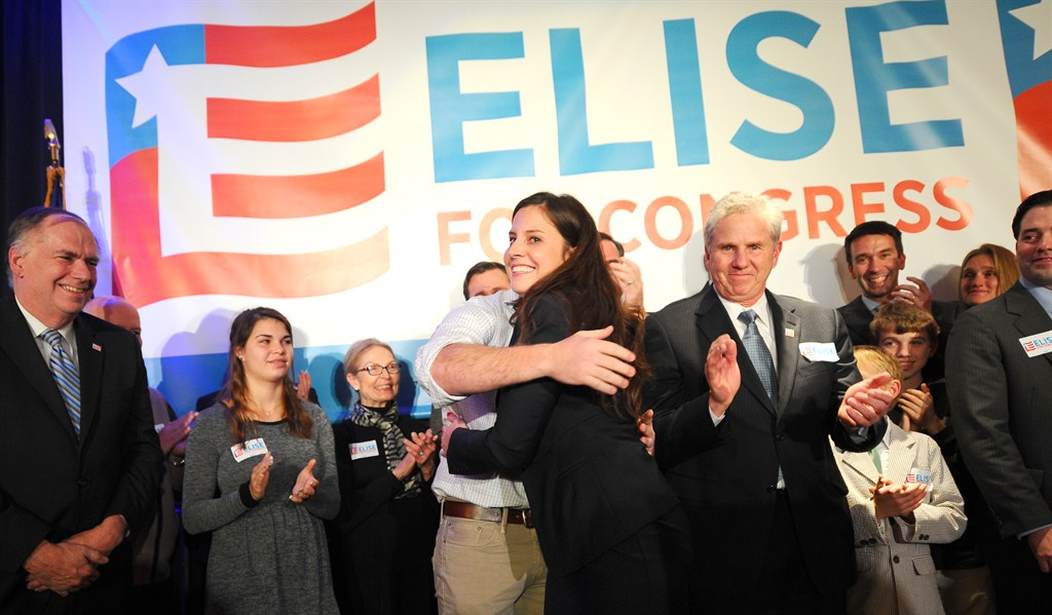Rep. Elise Stefanik (R, NY-21), the youngest GOP woman every elected to Congress, has established herself as not only an effective lawmaker, but a face of Republican women. The Republican Party has received criticism for years about the lack of female representation, and in the face of this criticism, Stefanik has dedicated herself to getting GOP women elected to Congress.
Launched just after the 2018 midterm elections, Stefanik’s group, Elevate-PAC or E-PAC for short, aims to engage, empower and elevate GOP women to win Congressional seats. This effort came to life after Stefanik served as the first female Recruitment Chair of the National Republican Congressional Committee (NRCC), and while in the role recruited over 100 GOP women to run in the 2018 cycle, but only Rep. Carol Miller (R, WV-3) was victorious. The struggle for these candidates was largely winning primaries, which is now where E-PAC steps in since the NRCC does not back primary candidates.
The best way to support electing more #GOPWomen ?????????????????????????????????is to donate directly to the #EPAC endorsed candidates ?? https://t.co/rMn5pPnHtN
— Elise Stefanik (@EliseStefanik) October 22, 2019
In addition to a historical lack of GOP women seeking Congressional seats, those women who have decided to run have struggled to win primary elections in every cycle. Because of the NRCC’s rule on primary election endorsements, Stefanik made it her personal mission to recruit and mentor female GOP candidates for Congress.
Recently, E-PAC was involved in a North Carolina special election for the 3rd congressional district. Dr. Joan Perry received the group’s support, but ultimately lost her bid to Republican Greg Murphy. Although this was a setback, E-PAC is working even more diligently to help GOP women win primaries for the 2020 cycle.
Recommended
In a press conference today, Stefanik announced a list of female GOP candidates who had received $5,000 from E-PAC. The list included a diverse group of Congressional districts, ranging from lean-GOP to solid Democratic, per Roll Call:
- Genevieve Collins in Texas’ 32nd District (Leans Democratic)
- Maria Elvira Salazar in Florida’s 27th District (Solid Democratic)
- Ashley Hinson in Iowa’s 1st District (Tilts Democratic)
- Michelle Steel in California’s 48th District (Leans Democratic)
- Young Kim in California’s 39th District (Likely Democratic)
- Former Rep. Karen Handel in Georgia’s 6th District (Tilts Democratic)
- Nicole Malliotakis in New York’s 11th District (Toss-up)
- Chele Farley in New York’s 18th’s District (Solid Democratic)
- Beth Van Duyne in Texas’ 24th District (Tilts Republican)
- Nancy Mace in South Carolina’s 1st District (Toss-up)
- Amanda Makki in Florida’s 13th District (Solid Democratic)
A few of these women have run for office previously. Most notably, Karen Handel ran and beat Jon Ossoff in a Georgia special election in June of 2017. Handel lost her re-election bid in the 2018 midterms.
These candidates needed to meet a fundraising threshold of $250,000 and had to present a path to an election victory in order to receive Stefanik’s endorsement and resources. Stefanik said that she is confident that these candidates have a strong chance at winning their respective districts.
Female representation is needed within the Republican Party as a whole, and an increase in GOP women will do nothing but help the party’s re-election chances both up and down the ballot.

























Join the conversation as a VIP Member